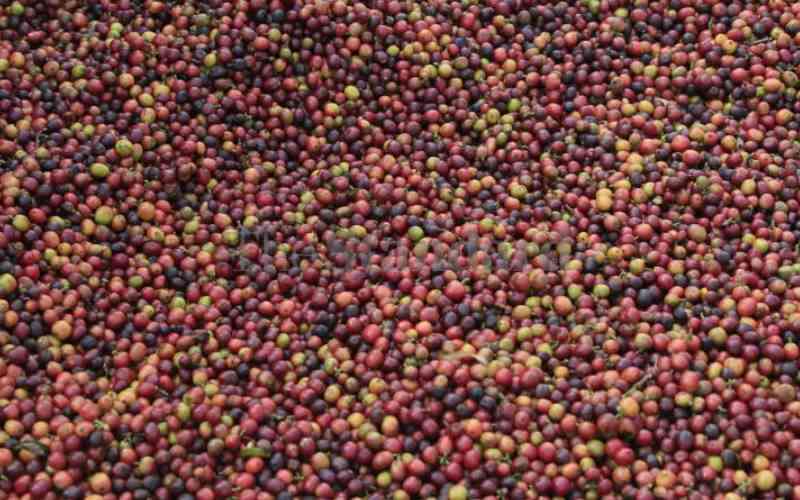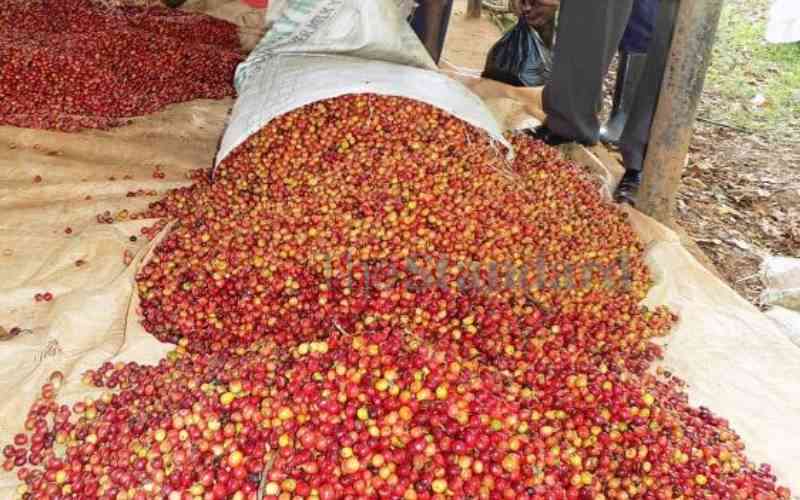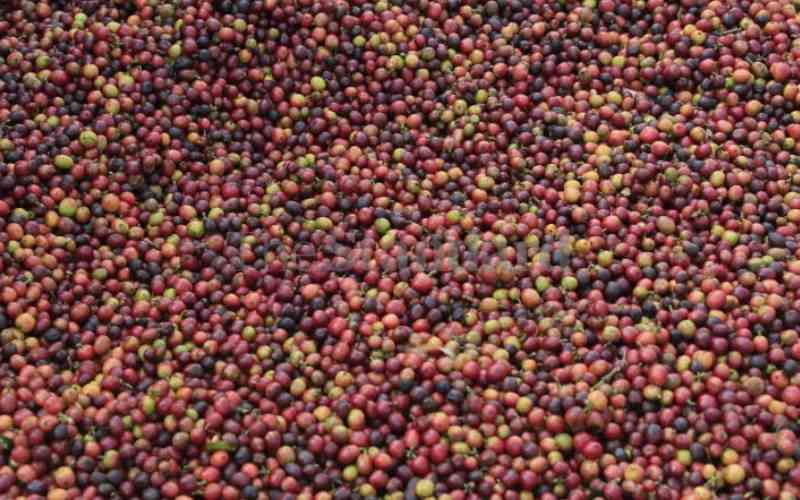 |
|
Othaya Coffee Farmers Society chairman Newton Nderitu explains the content of one of their products to Nyeri Governor Nderitu Gachagua, during the coffee sector stakeholders' meeting. [PHOTO: MOSE SAMMY/STANDARD] |
NYERI COUNTY: Vested interests by local and international brokers sprinkled with a liberal dose of politics and opaque operations have all conspired to frustrate thousands of coffee farmers in Nyeri County.
Consequently, the farmers who have been waiting for the payment of their produce delivered more than a year ago have got nothing despite promises from Governor Nderitu Gachagua.
The Nyeri County government promised to pay a minimum of Sh130 per kilogramme after marketing their produce internationally by bypassing local brokers, but is now on the receiving end from politicians, farmers and the national government.
Since he assumed office last year, Gachagua has embarked on an initiative to market Nyeri coffee directly to various global market sources, but appears to have underestimated the coffee marketing system which is a well-knit system dominated by international coffee dealers since the colonial days.
So far, it is estimated coffee worth about Sh2 billion has been sold, of which buyers have received less than Sh355 million. Governor Gachagua in a morning talk show in one of the local radio station last Friday said farmers will have to wait for at least a month to get paid.
COFFEE PROCEEDS
Gachagua's problems have been worsened by creditors who are demanding more than Sh850 million they advanced to farmers last year.
Early this month, during County Assembly proceedings, it emerged that Taifa Sacco Limited advanced more than Sh125 million to coffee farmers in Nyeri. Majority Leader Anthony Mwangi Kibuu told the County Assembly that the security of the loan was to be coffee proceeds of the year 2013/2014, which are yet to be fully paid for by the county government.
Kibuu said coffee factories in Mukurweini Sub-County had borrowed more than Sh62 million, Othaya Sh5 million; Mathira more than Sh52 million and Nyeri Central Sh125 million from Taifa Sacco.
Coffee millers and marketers are demanding Sh132 million, under the umbrella body, Commercial Coffee Millers and Marketing Agents Association (CCMMAS) which they had advanced as credit to contracted farmers.
According to CCMMAS, the farmers had not paid the money by the time the Nyeri county government announced new coffee marketing plans. The millers say their agenda is purely business and they are not interested in politics.
CCMMAS chairman James Mureithi said the Nyeri county government ought to respect all chain players and more so their contribution to the growth of the local economy.
"We have no political agenda in Nyeri County. The Governor ought to address the farmers' plight and stop dragging other players into his muddles," said Mureithi.
"We have survived in the business because we always observe business ethics and the interest to uplift the economic life of the majority of the farmers," he added.
When the governor announced his new marketing plans, one of the dominant coffee dealers, C Dorman, through its Managing Director Bridget Carrington wrote a letter on January 14 this year to clients and friends around the world warning them of the developments in Nyeri.
Stay informed. Subscribe to our newsletter
"We are praying that the status quo will be restored before it is too late and our best case scenario would be to write a follow up mail in a week or two saying it was storm in a coffee cup. However, what does this mean in the immediate with a lot of visits planned for the coming week? It means that visiting the Central Kenya Coffee Mill (CKCM) will not be possible until it has the blessing of the Nyeri Governor to resume normal activity," Carrington said.
The MD said Gachagua's marketing plan meant they could not visit factories in Nyeri County because they would have been be accused of trying to sabotage the new direction for sale.
"Of paramount importance to us is the personal safety of all visitors, so please bear with us if we need to alter the programme that has already been fixed,' she said.
In bid to quell the rising dissent from coffee farmers, Gachagua vowed not to relent until Nyeri farmers are fully liberated from the chain of exploitative international buyers.
INCITING FARMERS
The county government trade executive Stanley Miano termed the unfolding crisis as man-made and accused the international coffee affiliates operating locally of inciting the farmers.
He claimed that 59 per cent of coffee was sold through the auction and 41 per cent through direct sales. He, however could not confirm where the money is deposited and who the accruing interest will be paid to.
"We have continued to encounter hostile reception in some of the countries we are looking for markets due to wrong advice the international buyers are receiving from their local subsidiaries. For example, they cheated reputable international buyers that they should not buy our coffee because it is already contracted," said Mr Miano.
Mwago said Carrington's letter had dissuaded their friends and clients from visiting Nyeri as well as buying coffee from farmers until status quo is guaranteed.
Wachira Mwago, a close ally of the governor who is Also the chairman of Mt Kenya Coffee Marketing and Production Company (MKCMP)-the outfit formed by the county government to market its coffee, acknowledged there are hurdles in their way.
"Our initiative has so far received sharp protests from international buyers following advice from their local affiliates. For the last one year we have been on a mission to source direct markets but it has not been easy as international buyers are still protesting against our idea following advice by their local affiliates," said Mwago
But as Gachagua tries to resolve the crisis, some societies whose farmers had defied his directive and submitted their produce to millers got paid between Sh60 and Sh80 per kilogramme submitted.
The farmers are drawn from Mutheka, Thiriku, Gachatha, Muthuaini, and Gathaithi coffee societies.
Mwago, however, insists that Nyeri farmers produced 42 million kilogrammes of cherry, translating to about 6,500 metric tonnes of clean coffee. Immediately the letter was released, the international coffee dealers hit back by ceasing from buying Nyeri coffee.
"We continued to fight back but equally never released any coffee to the market. So the coffee was stored for four months as they continue sourcing for new markets," Mwago said.
"What has happened in Nyeri can only be described as an economic catastrophe and will have far reaching social economic implications that will take years to correct. It is up to the national government and all institutions involved to check on this kind of uninformed meddling of county government in the economic activity of their residents without due regard to the implications. If such is not checked it is only a matter of time before residents rise up against their counties thereby killing devolution for which so much was hyped," said a senior officer with the national government who declined to be named.
HIGH PRICES
The few bags of clean coffee sold under the direct sales system by Kenya Co-operative Coffee Exporters (KCCE) fetched fairly high prices.
Data in our possession from Nairobi Coffee Exchange confirms that KCCE sold coffee of grade AA of Giakanja coffee factory at Sh43,543.5 ($500.5) per 50kg bag. The rest of the coffee was offered for sale at the Nairobi coffee auction.
In an advertisement in one of the local dailies last Thursday, KCCE Chief Executive Officer Lucy Murumba said Nyeri coffee was delayed for sale though she did not give reasons.
"KCCE confirms that they were only allowed to market Nyeri coffee by Coffee Board of Kenya after March 24, (four months after the season started) and thereafter, actual sale started in April as the law requires that samples are submitted two weeks before the auction," said Mrs Murumba.
KCCE has been accused of failure to advise the county government on the dynamics of coffee marketing.
 The Standard Group Plc is a
multi-media organization with investments in media platforms spanning newspaper
print operations, television, radio broadcasting, digital and online services. The
Standard Group is recognized as a leading multi-media house in Kenya with a key
influence in matters of national and international interest.
The Standard Group Plc is a
multi-media organization with investments in media platforms spanning newspaper
print operations, television, radio broadcasting, digital and online services. The
Standard Group is recognized as a leading multi-media house in Kenya with a key
influence in matters of national and international interest.
 The Standard Group Plc is a
multi-media organization with investments in media platforms spanning newspaper
print operations, television, radio broadcasting, digital and online services. The
Standard Group is recognized as a leading multi-media house in Kenya with a key
influence in matters of national and international interest.
The Standard Group Plc is a
multi-media organization with investments in media platforms spanning newspaper
print operations, television, radio broadcasting, digital and online services. The
Standard Group is recognized as a leading multi-media house in Kenya with a key
influence in matters of national and international interest.









